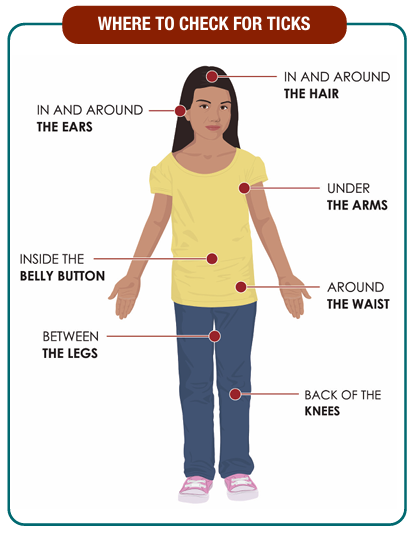Tick Bite: What to Do
Tick bites can make people sick. Below are some steps that you can take after a tick bite to reduce your chances of getting sick and how to get treatment promptly if you do get sick.
Remove the tick as soon as possible
1. Use fine-tipped tweezers to grasp the tick as close to the skin as you can.
2. Pull upward with steady, even pressure. Don’t twist or jerk the tick.
3. After removing the tick, clean the bite area and your hands with rubbing alcohol or soap and water.
4. Dispose of the tick by flushing it down the toilet. If you would like to bring the tick to your healthcare provider for identification, put it in rubbing alcohol or place it in a sealed bag/container.

Consider calling your healthcare provider
In general, CDC does not recommend taking antibiotics after tick bites to prevent tickborne diseases. However, in certain circumstances, a single dose of doxycycline after a tick bite may lower your risk of Lyme disease. Consider talking to your healthcare provider if you live in an area where Lyme disease is common.
Watch for symptoms for 30 days
Call your healthcare provider if you get any of the following:
• Rash
• Fever
• Fatigue
• Headache
• Muscle pain
• Joint swelling and pain
Treatment for tickborne diseases should be based on symptoms, history of exposure to ticks, and in some cases, blood test results. Most tickborne diseases can be treated with a short course of antibiotics.
 Common questions after a tick bite
Common questions after a tick bite
Should I get my tick tested for germs?
Some companies offer to test ticks for specific germs. CDC strongly discourages using results from these tests when deciding whether to use antibiotics after a tick bite.
• Results may not be reliable. Laboratories that test ticks are not required to meet the same quality standards as laboratories used by clinics or hospitals for patient care.
• Positive results can be misleading. Even if a tick contains a germ, it does not mean that you have been infected by that germ.
• Negative results can also be misleading. You might have been bitten unknowingly by a different infected tick.
Can I get sick from a tick that is crawling on me but has not yet attached?
Ticks must bite you to spread their germs. Once they attach to you, they will feed on your blood and can spread germs. A tick that is crawling on you but not attached could not have spread germs. However, if you have found a tick crawling on you, it’s a sign there may be others: do a careful tick check.
How long does a tick need to be attached before it can spread infection?
Depending on the type of tick and germ, a tick needs to be attached to you for different amounts of time (minutes to days) to infect you with that germ. Your risk for Lyme disease is very low if a tick has been attached for fewer than 24 hours. Check for ticks daily and remove them as soon as possible.

 Common questions after a tick bite
Common questions after a tick bite